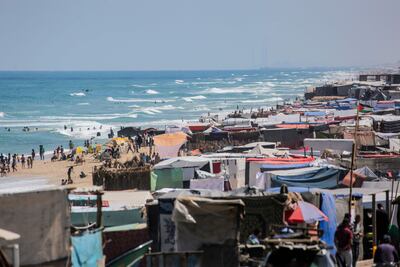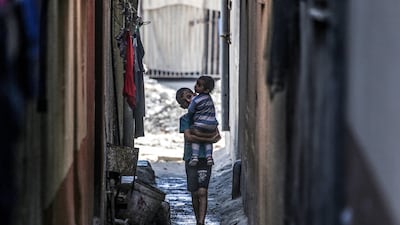Live updates: Follow the latest on Israel-Gaza
Egypt’s government has given a panel of international law experts the job of identifying and assessing the ramifications of further punitive action against Israel in response to military operations in Rafah, sources told The National.
They said the panel also included top constitutional experts, as well as senior members of the nation’s intelligence services.
There has been no official announcement on the panel’s creation.
The sources, who spoke to The National on condition of anonymity, would not say who is sitting on the panel, where it is holding its meetings or divulge details of its mandate.
However, its creation reflects the depth of anger Cairo feels over the seizure by Israel on May 7 of the Palestinian side of the Rafah border crossing between Egypt and Gaza, as well as its rapidly expanding ground operation in the border city.
Egypt had long warned Israel against launching a ground offensive in Rafah, where some 1.5 million Palestinians had taken refuge from fighting elsewhere in Gaza. It has said the capture of the Gaza side of the Rafah crossing posed a threat to its national security.
The latest Egyptian move also speaks to Egypt’s concern to stay within the boundaries of international law, avoid punitive actions by the US – its strongest western backer and sponsor of its 1979 peace treaty with Israel – and not to further destabilise a Middle East already torn by a seemingly unprecedented and simultaneous host of conflicts.
Egypt, the most populous Arab nation with 106 million people, already has had much to deal with beside the Hamas-Israel war across its eastern border.
Sudan to the south, which has long been viewed a sphere of Egyptian influence, has been ravaged by a 13-month civil war that has sent nearly 500,000 refugees into Egypt. Libya to the West, another extension of Egyptian national security, has been beset by war and divisions since an uprising 13 years ago.
Egypt and Israel are bound by their milestone 1979 peace treaty that ended decades of hostilities between the two Middle East neighbours, including four wars between 1948 and 1973. Of late, the two have established close economic links, especially in the field of energy, and have been co-operating to combat human and drug trafficking, as well as on counterterrorism.
The treaty has dramatically altered a regional political landscape defined in large part by nearly a century of conflict between the Arabs and Israel, and may have in many ways paved the way for Jordan to follow suit in 1994 and more recently four other Arab nations establishing diplomatic relations with Israel.
For Egypt, making peace with Israel has meant billions of dollars in US military and economic aid over the years. However, the treaty has failed to live up to expectations it would be a prelude to resolving the decades-old Palestinian-Israeli conflict.
The sources said that while Egypt planned further punitive measures against Israel, like downgrading its diplomatic representation or withdrawing its ambassador, they would not include the suspension of the peace treaty.
“The Hamas-Israel war has put Egypt in a very awkward position and caused it a series of serious disappointments," said Mohammed Anis Salem, a retired Egyptian diplomat who now sits on the Egyptian Council for Foreign Affairs, a think tank.
“But calls for the suspension of the peace treaty on social media or in talk shows are essentially a reflection of popular anger and anxiety.
“Rather than talking about rupturing a treaty so important it has restructured the entire region, we need to talk about how to de-escalate and pull back from the brink.”

Egypt has been scathingly critical of Israel since the Gaza war began seven months ago following Hamas’s attack on southern Israel in October, in which about 1,200 people were killed and another 250 taken hostage, according to Israeli tallies.
The attack drew a devastating response from Israel, whose bombardment and invasion of Gaza has killed more than 35,000 Palestinians, wounded twice that number and displaced the vast majority of the enclave’s 2.3 million residents.
Egypt has already shown its anger over Israel's capture of the Gaza side of the Rafah border crossing and the displacement of hundreds of thousands of Palestinians who had found shelter there.
On Sunday, Egypt said it was intervening in support of South Africa’s case in the International Court of Justice accusing Israel of genocide, its strongest public rebuke to Israel since the Gaza war broke out.
The Foreign Ministry, which made the announcement, has yet to give details of the steps Cairo planned to take to implement its decision.
Egypt has also refused to co-operate with Israel on sending humanitarian aid to Gaza through the Rafah crossing after the latter’s seizure of the facility. Its forces close to the borders with Israel and Gaza in the Sinai Peninsula have been placed on high alert but instructed to show extreme restraint if provoked or in dealing with incidents such as stray artillery shells or misguided air strikes.
On Tuesday, Egyptian Foreign Minister Sameh Shoukry accused Israel of seeking to dodge its responsibility for the humanitarian crisis in Gaza after his Israeli counterpart said Egypt was not allowing aid into the coastal territory.
“Egypt affirms its categorical rejection of the policy of distorting the facts and disavowing responsibility followed by the Israeli side,” Mr Shoukry said.
He was responding to a tweet on X by Israeli Foreign Minister Israel Katz in which he wrote: “Yesterday, I spoke with UK Foreign Secretary David Cameron and German Foreign Minister Annalena Baerbock about the need to persuade Egypt to reopen the Rafah crossing to allow the continued delivery of international humanitarian aid to Gaza.”
He added: “The key to preventing a humanitarian crisis in Gaza is now in the hands of our Egyptian friends.”


